On this day in history, September 4, 2016, Mother Teresa is canonized: ‘Generous dispenser of divine mercy’

[ad_1]
Mother Teresa was canonized, or officially recognized as a saint, on this day in history, Sept. 4, 2016.
She was given the title “Saint Teresa of Calcutta.”
“Mother Teresa, in all aspects of her life, was a generous dispenser of divine mercy, making herself available for everyone through her welcome and defense of human life, those unborn and those abandoned and discarded,” said Pope Francis during her canonization Mass.
ON THIS DAY IN HISTORY, SEPTEMBER 3, 1777, STARS AND STRIPES FLIES IN BATTLE FOR FIRST TIME
Mother Teresa “was committed to defending life,” said Pope Francis, and “bowed down before those who were spent, left to die on the side of the road, seeing in them their God-given dignity.”
“For Mother Teresa, mercy was the ‘salt’ which gave flavor to her work, it was the ‘light’ which shone in the darkness of the many who no longer had tears to shed for their poverty and suffering,” he said.
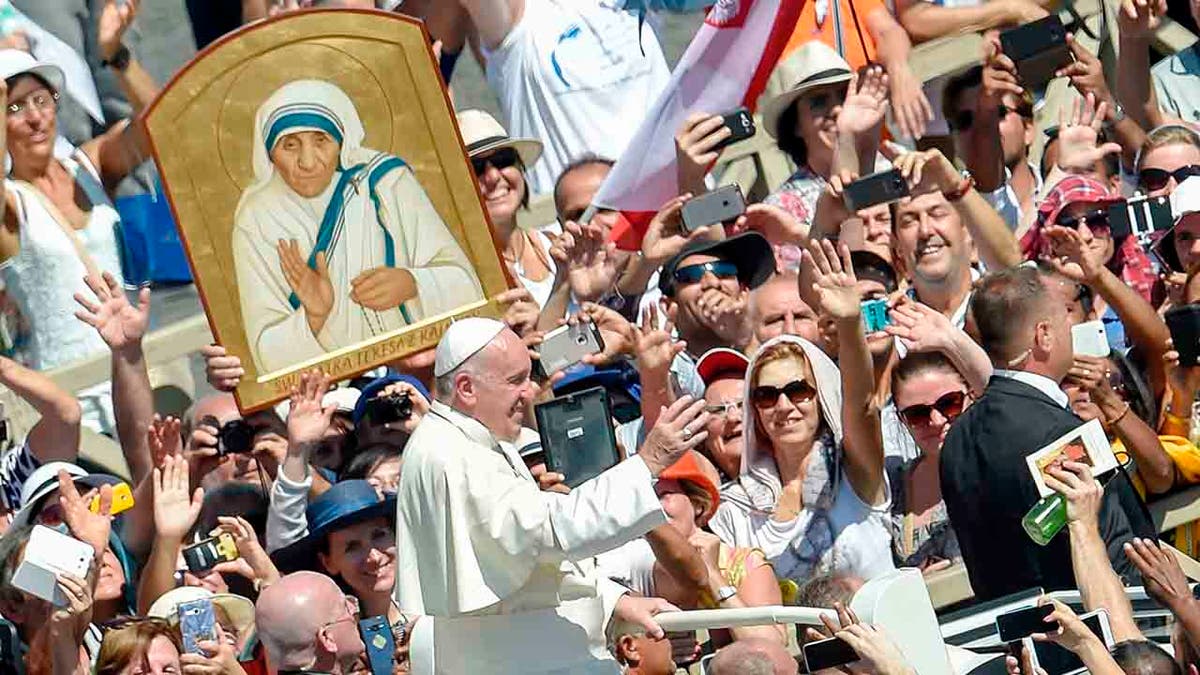
Pope Francis canonized Mother Teresa on Sept. 4, 2016, giving her the new title of Saint Teresa of Calcutta. The Albanian nun died almost exactly 19 years before her canonization. (ANDREAS SOLARO/AFP via Getty Images)
The canonization Mass occurred on the day before the 19th anniversary of her death on Sept. 5, 1997, at age 87.
Born Agnes Gonxhe Bojaxhiu in what is now known as Skjope, North Macedonia, Mother Teresa was of Albanian heritage, according to the website for the Nobel Peace Prize.
First feeling the call to religious life during her adolescence, she left home in September 1928 at age 18 and moved to Ireland, joining the Sisters of Loreto.
With the Sisters of Loreto, the teenage Agnes was given the religious name “Sister Mary Teresa,” in honor of St. Thérèse of Lisieux, the Vatican’s website says.
A little over a year after her arrival in Ireland, she was sent to one of the Sisters of Loreto’s missions in India, a country that would become her adopted homeland.
In 1948, Mother Teresa left the Sisters of Loretto to begin working on founding a new religious order, the Missionaries of Charity.
She made her first profession of vows in May 1931, and was assigned to the Sisters of Loreto’s community in Calcutta, said the Vatican’s website.
NORTH DAKOTA MILLENNIAL WOMAN ADVANCES TOWARD SAINTHOOD AFTER THE ‘HEROIC SANCTITY’ OF HER CANCER BATTLE
She professed her final vows with the Sisters of Loreto in 1937, and became known as “Mother Teresa.”
In 1948, Mother Teresa would leave the Sisters of Loretto to begin working on founding a new religious order, the Missionaries of Charity.
“On Aug. 17, 1948, she dressed for the first time in a white, blue-bordered sari and passed through the gates of her beloved Loreto convent to enter the world of the poor,” said the Vatican’s website.
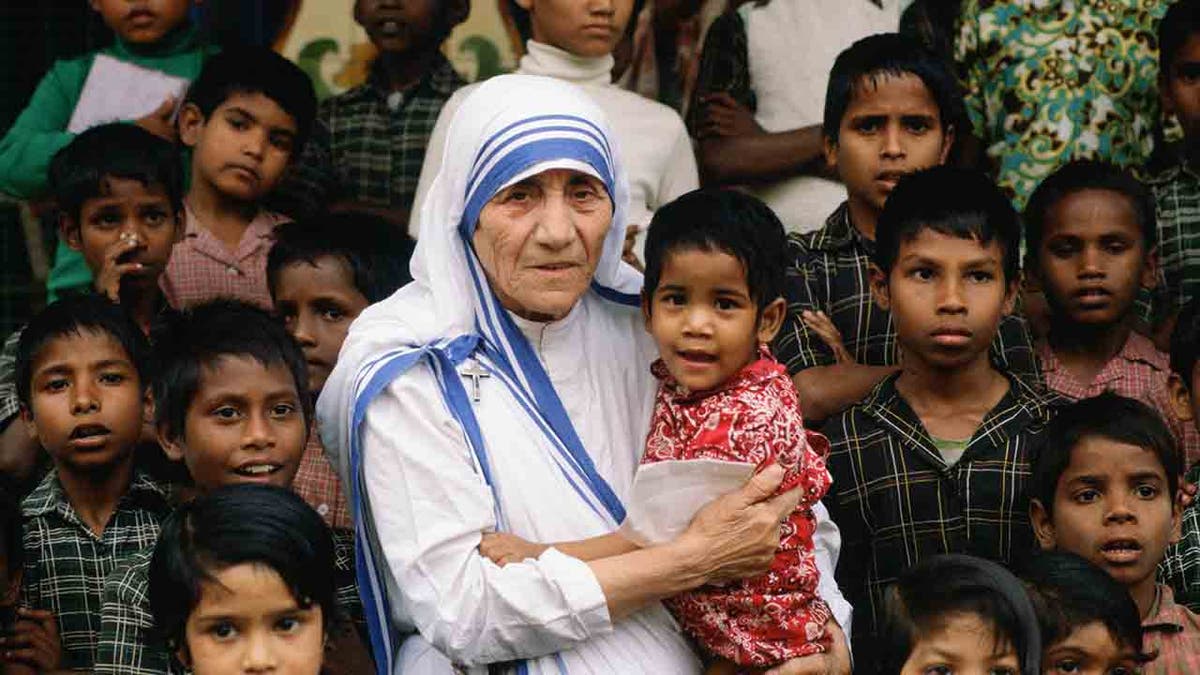
Mother Teresa was the founder of the Missionaries of Charity, a now-worldwide religious congregation. The group’s habit consists of a blue-and-white sari, seen here on Mother Teresa herself. (Tim Graham/Getty Images)
Just over four months later, Mother Teresa first encountered what would be the rest of her life’s work.
“On 21 December she went for the first time to the slums. She visited families, washed the sores of some children, cared for an old man lying sick on the road and nursed a woman dying of hunger and TB,” said the Vatican’s website.
In 1950, the Missionaries of Charity was officially approved to operate within the Archdiocese of Calcutta.
“By faith, I am a Catholic nun. As to my calling, I belong to the world.”
The order now exists throughout the world to care for the dying and the poorest of the poor.
In the decades after founding the Missionaries of Charity, Mother Teresa gained international recognition for her work serving the poor and dying.
MISSOURI MIRACLE? EXHUMED NUN WHOSE BODY DID NOT DECOMPOSE ATTRACTS TRAVELERS TO SMALL TOWN
She received the 1979 Nobel Peace Prize “for her work for bringing help to suffering humanity.”
“By blood, I am Albanian. By citizenship, an Indian. By faith, I am a Catholic nun. As to my calling, I belong to the world. As to my heart, I belong entirely to the Heart of Jesus,” she once said.
While “all Christians are called to be saints,” according to the USCCB website, “saints are persons in heaven (officially canonized or not), who lived heroically virtuous lives, offered their life for others or were martyred for the faith, and who are worthy of imitation.”
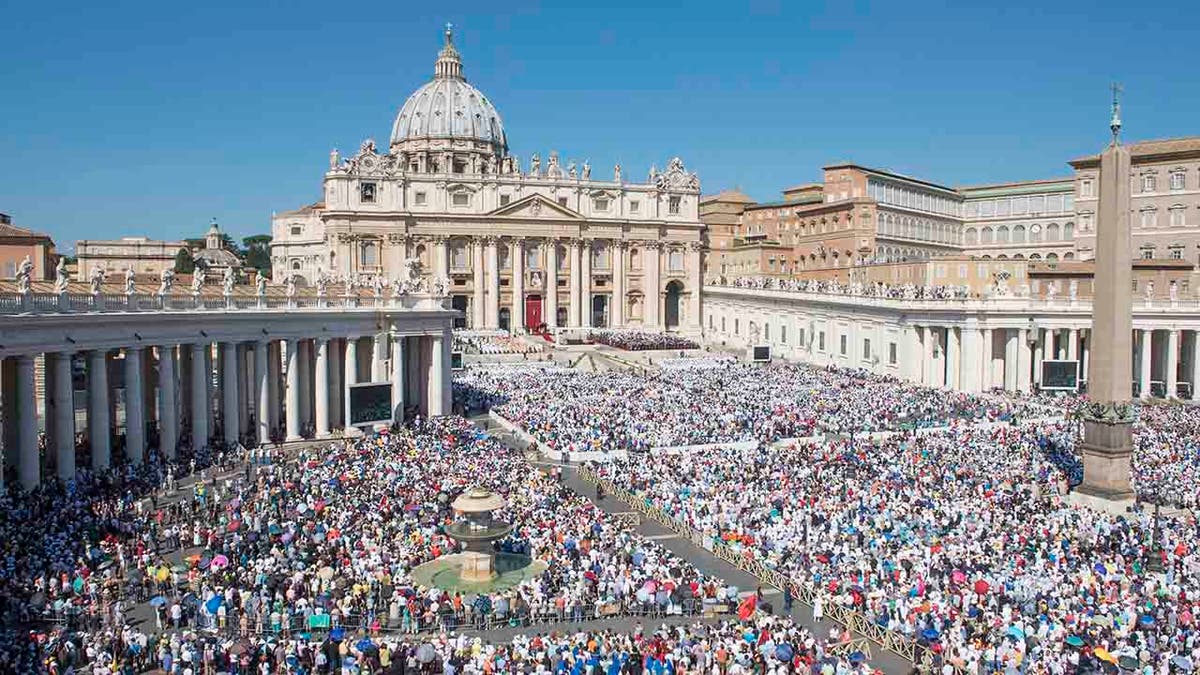
A large crowd attended the canonization of Mother Teresa on Sept. 4, 2016. (Getty Images)
After a person dies, there is typically a five-year waiting period before the process toward canonization begins, says the USCCB.
In 1999, two years after her death, this five-year period was waived by the now-St. Pope John Paul II.
Once the person has been approved by the Vatican and declared to have lived a holy life, the person is declared “Venerable,” according to the Vatican’s website.
After this step, the Vatican has to approve of a miracle attributed to the intercession of the potential saint.
BALTIMORE WOMAN, AN IMMIGRANT FROM CUBA, IS ONE STEP CLOSER TO SAINTHOOD
Typically, this involves a medical healing that cannot be explained otherwise by science.
Purported miracles can be submitted for investigation to the Vatican’s Dicastery for the Causes of Saints, which is the organization that determines the legitimacy of these claims.
Scientists and doctors will vote on whether the alleged miracle can possibly be explained by science, the Vatican website says.
Once the miracle is approved, the person is “beatified” and given the title of “Blessed.”
For Mother Teresa’s canonization, the two miracles officially attributed to her intercession were the healing of an Indian woman and a Brazilian man.
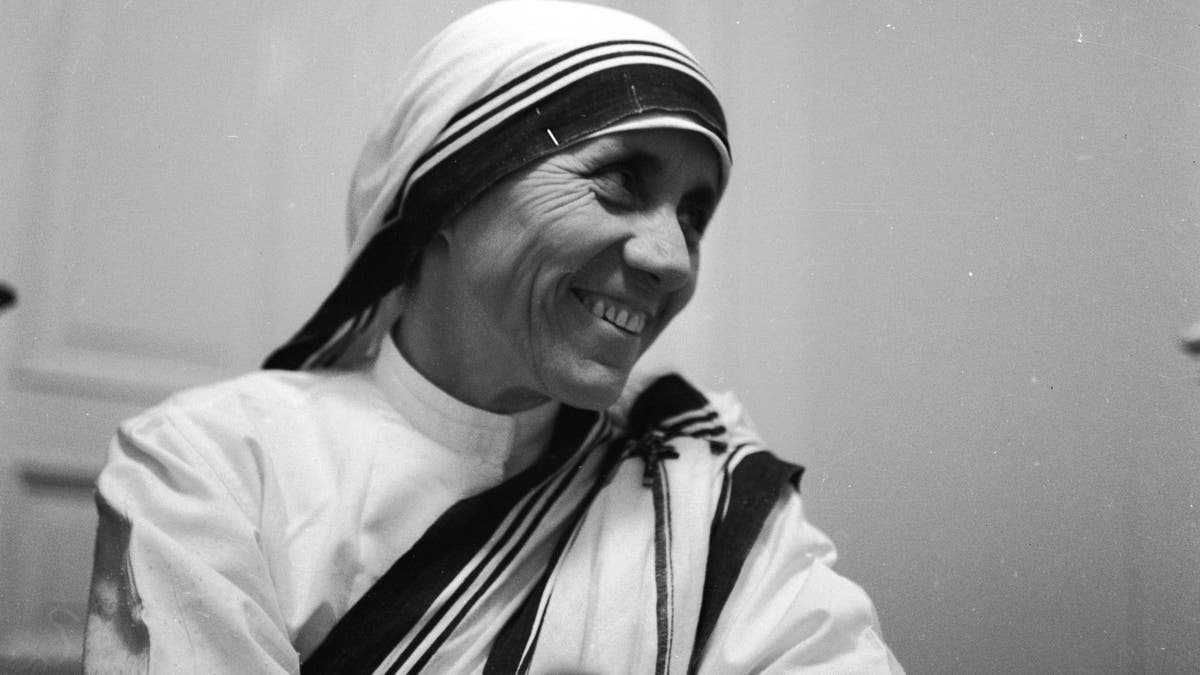
Mother Teresa was awarded the Nobel Peace Prize in 1979 “for her work for bringing help to suffering humanity.” (Keystone Features/Getty Images)
The first miracle, the healing of Monica Besra of Bengali, India, occurred in 1998, says the website for the Magis Center, a Catholic organization.
Besra had been diagnosed with a cancerous tumor and was deemed to be terminally ill, and too weak to operate on by doctors.
“One day, Monica went to Mass and saw a ray of light emit from a picture of Mother Teresa. Then, one of the Missionary of Charity sisters took a medal of the Virgin Mary and tied it around Monica’s swollen abdomen,” said the website.
INDIANA PRIEST SAYS HE’S CURED OF BRAIN TUMOR AFTER TRIP TO LOURDES: ‘THANKS BE TO GOD’
That day, Sept. 5, 1998, was the first anniversary of Mother Teresa’s death.
The sister then prayed, “Mother, today’s your day. You love the poor. Do something for Monica.”
The tumor disappeared eight hours later, noted the Magis Center.
Of the 11 doctors that examined Besra, only two were Catholic — and none had an explanation as to how she had been cured so quickly.
In 2002, this healing was approved by the Vatican as being miraculous. Mother Teresa was beatified in October 2003.
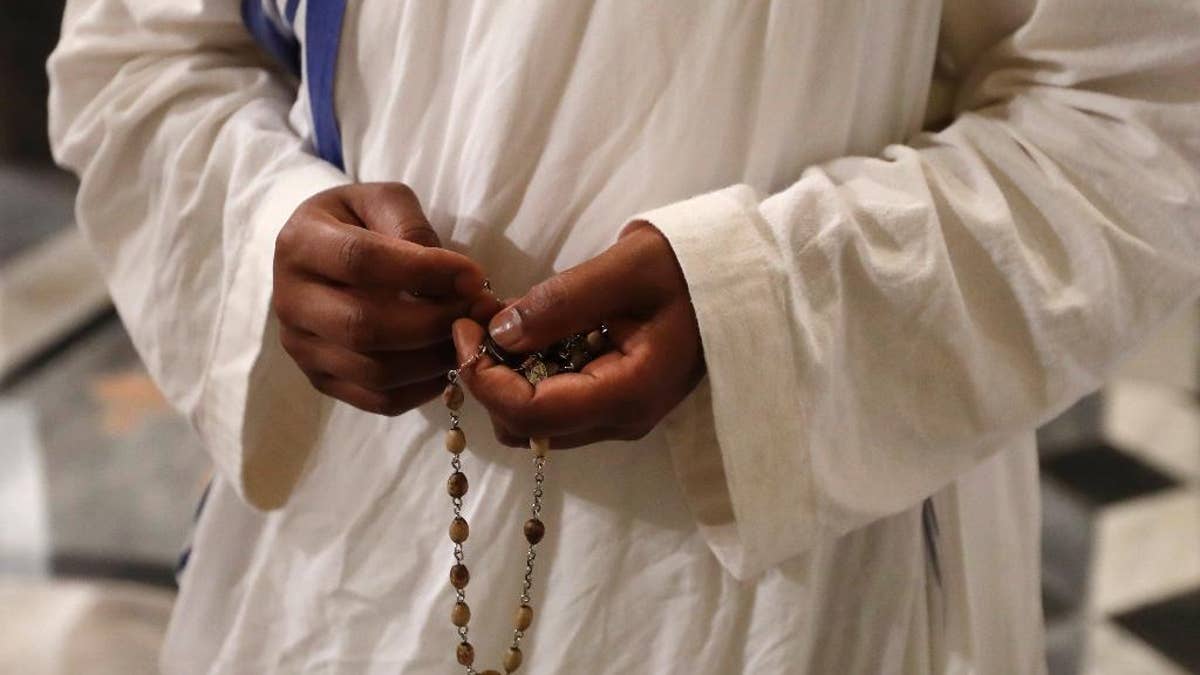
A nun of Mother Teresa’s Missionaries of Charity holds a rosary during a vigil of prayer in preparation for the canonization of Mother Teresa in the St. John in Latheran Basilica at the Vatican, Friday, Sept. 2, 2016. Her order started in Calcutta and is now located around the world, tending to the extreme poor. (The Associated Press)
The second miracle attributed to Mother Teresa’s intercession was the healing of Marcilio Andrino in 2008.
Andrino, who lived in Brazil, had a brain infection and hydrocephalus, said the Magis Center.
“Marcilio’s wife, Fernanda, would often place a relic of Mother Teresa on her husband’s head. She also prayed a novena to Mother Teresa of Calcutta asking for healing, but Marcilio’s case only got worse,” said the website.
He was brought to the hospital in a last-ditch effort to save his life — but that turned out to be unnecessary.
On Dec. 9, 2008, Andrino slipped into a coma in the early hours of the morning, said the Magis Center.
He was brought to the hospital in a last-ditch effort to save his life — but that turned out to be unnecessary.
CLICK HERE TO SIGN UP FOR OUR LIFESTYLE NEWSLETTER
“The doctor who was to operate left the operating room to seek assistance from another doctor. When he returned, Marcilio was awake and in no pain; he even asked the doctor, ‘What am I doing here?’ This was at 6:10 p.m., only about 14 hours after Marcilio had fallen into a coma,” said the Magis Center.
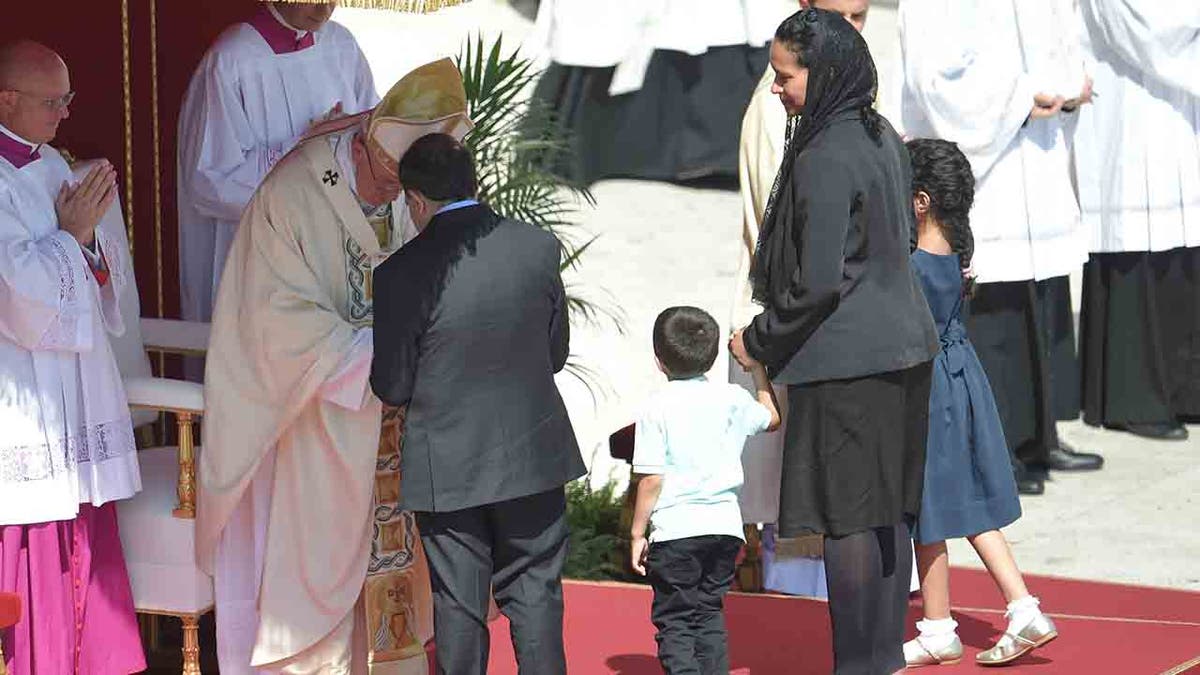
Brazilian mechanical engineer Marcilio Andrino (center) and his wife Fernanda Nascimento Rocha are greeted by Pope Francis during Mother Teresa’s canonization Mass. Andrino’s miraculous healing from brain conditions was attributed to Mother Teresa’s intercession. (ANDREAS SOLARO/AFP via Getty Images)
Brain scans taken that day and four days later showed remarkable and inexplicable healing.
“Multiple surgeons looked at the brain scans, but none could find an explanation as to how Marcilio healed so quickly,” said the Magis Center.
CLICK HERE TO GET THE FOX NEWS APP
This miracle was approved by the Vatican in December 2015 — and the date for Mother Teresa’s canonization was announced in March.
[ad_2]